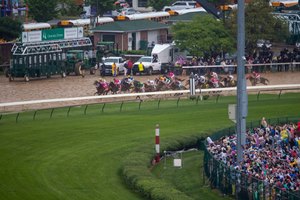Interference Rules Dominate Harmonization Meeting


Racing regulators and officials from around the world gathered in Saratoga Springs, N.Y., Aug. 9 in a joint meeting of the Association of Racing Commissioners International and the International Harmonization of Racing Rules Committee of the International Federation of Horseracing Authorities.
Although the agenda numbered 16 items on topics including an international stewards program, padded whips and crops, and the 2020 International Stewards' Conference, the majority of the day-long program was devoted to presentations on the benefits of Category 1 rules regarding interference and disqualifications.
Over a four-hour period, officials from Australia, Hong Kong, South America, and Europe, among others, offered their perspectives on Category 1 rules, which stipulate an inquiry or objection must meet two criteria to result in a change in the order of finish: the stewards must determine that one horse interfered with another, and that the horse that suffered the interference would have beaten the horse that caused the interference.
The United States racing jurisdictions operate under Category 2 rules, which state that after stewards determine that a foul has occurred, they assess whether the foul cost the bothered horse a placing. If so, the horse that caused the interference is disqualified and placed behind the horse that was fouled.
Only the U.S., Canada, and Turkey operate under Category 2 rules.
The debate around U.S. interference rules was amplified this year when Maximum Security was disqualified from first place in the Kentucky Derby Presented by Woodford Reserve (G1) and placed 17th after Kentucky stewards deemed that he had impacted the progress of War of Will, who finished eighth. War of Will, in turn, interfered with Long Range Toddy (finished 17th) and Bodexpress (14th), and Maximum Security was placed behind Long Range Toddy, the horse with the lowest finish among those who were fouled.
Experts on Category 1 rules believe Maximum Security would not have been disqualified because he would have been considered "the best horse" in the race and unlikely to have been beaten by the fouled horses. Those rules would also prohibit the connections of the horses that were fouled from lodging a claim of foul, as the disqualification would have affected neither the top five finishers in the race nor the purse distribution.
Kim Kelly, the chief stipendiary steward for the Hong Kong Jockey Club, pointed out that everyone on the Harmonization Committee was in favor of Category 1 rules. Meeting attendees, most of them from the United States, had mixed opinions, asking questions about safety, subjectivity, and the effect of the rule on vertical exotics players.
"I'm not sold on (Category 1), to be honest," said Erinn Higgins, a steward with the New York State Gaming Commission. "I think it's an interesting topic. Our goal is to look out for the owners, the trainers, and the betting public, and we're looking out not only for the winner, but for the guys who finish second and third, too."
Earlier, Higgins had asked Kelly whether he received questions or concerns from owners of horses that had been interfered with, to which he responded in the negative.
Several jurisdictions said that after adopting Category 1 rules, they had also increased jockey fines for reckless riding, in order to discourage a "win at all costs" attitude.
"I think (changing to Category 1) would take some subjectivity (out of stewards' decisions) and add more consistency," said Terry Meyocks, the president and CEO of the Jockeys' Guild. "It would be more unfair to owners, trainers, and bettors who finished second or third if interference cost them a placing."
He was also concerned about the prospect of increasing fines.
"The fines are already getting out of control, sometimes for what a horse did, not even for what a jockey did," he said.
Kim characterized a Category 2 disqualification, such as that of Maximum Security, as a "gross injustice" to bettors.
"The only question is which horse was best in the race," he said. "Is there any sport in the world that doesn't reward the best team on the day?"
He was candid in presenting stewards' priorities in Category 1 races.
"In the initial stages, we're not interested in whether the ride was reckless," he said. "In the initial stages, we want to know if interference occurred and if it affected the result of the race."
Once that has been determined, the stewards will assess the jockey's ride and assign any applicable fines or suspensions.
"Sports are about fairness," he said. "It's not about penalizing every single person associated with a horse because of the actions of a jockey."
Tom Sage, director of the Nebraska Racing Commission and chair-elect of ARCI, suggested that jockeys or harness drivers might be willing to risk a fine and suspension if they could win a race with a substantial purse.
RCI president Ed Martin found merit in Sage's concern but believes it's an issue that can be resolved.
"Regulators work for the public, and what Category 1 does is punish a jockey but not the bettor, if the horse was going to win, anyway," Martin said. "The most compelling argument to be made for adopting Category 1 in North America is that we could improve the marketability of our racing product worldwide. Any obstacles to that should be removed."
